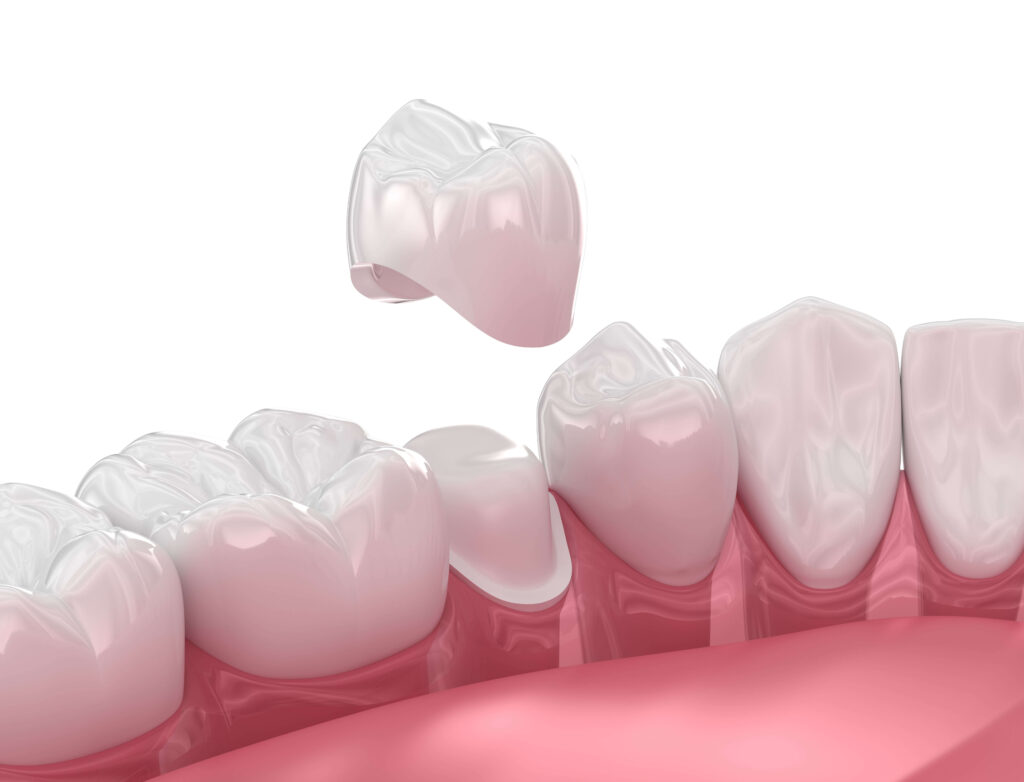
A dental crown can replace a missing tooth or cover a broken one to restore your smile. Not only can it improve the appearance of your teeth, it can help with function by allowing you to bite and chew normally.
What are Dental Crowns?
A dental crown is a tooth-shaped cap over the tooth or dental implant. With a dental cap, your dentist can restore the normal shape, size, and function of a missing, broken, or weak tooth. It can also be used for a cracked tooth. Dental crowns are often placed to add structure to the tooth with a dental bridge, but in some cases, they can be used strictly for cosmetic purposes.

Types of Crowns
There are several different types of dental crowns. The crown can be made from several different materials, including resin, ceramics, metal alloys, or porcelain. Historically, metal crowns were most common because metal crowns rarely chip, but stainless steel crowns and those with metal alloys were not ideal for many reasons. More commonly today, tooth-colored crowns (such as porcelain crowns, zirconia crowns, and ceramic crowns) are the treatment of choice. Your dental crown can be colored to match the natural color of your teeth enamel, allowing it to blend in and go unnoticed. The crown should not only look natural but fit comfortably as well.
Why You Might Need a Dental Crown
You might require treatment with a dental crown if you have a:
- Cavity or tooth decay that is too large to be repaired with a filling
- Missing tooth and need a bridge
- Dental implant that needs to be covered
- Cracked or weakened tooth
- Root canal treatment
- Discolored or misshaped tooth you’d like to cover
- Prevent the opposing teeth from shifting
What to Expect During Treatment
Before your dental crown procedure, the tooth will be prepared. Dr. Khan will begin by filling a cavity or performing a root canal if necessary. The outer portion of the natural tooth will be removed along with any areas of decay, keeping the deeper tooth structure intact. An impression of your teeth will then be made in order to create an exact fit for your crown. Temporary crowns will be placed while your permanent crown is being made.
You will have a second appointment once your crown is ready. At this appointment, Dr. Khan will place your crown over the entire tooth and make any adjustments to ensure a comfortable and natural fit. When you and Dr. Khan are both happy with the way the crown fits, looks, and feels, it will be cemented into place with dental adhesive.
Real Patient Testimonials
After Treatment with a Dental Crown
After treatment, Dr. Khan will provide you with all the necessary information on how to care for your dental crown. You should maintain good oral hygiene by flossing daily, brushing your teeth twice a day, and receiving a professional cleaning at appropriate intervals that are discussed. To protect your crown from damage, you should avoid chewing on ice or hard foods. If you grind or clench your teeth, you should protect your dental crown by wearing a mouth guard at night. Regular checkups will allow your dentist to ensure your crown is still in good condition.
A crown can fall out due to an improper fit or washed-out cement. If this happens, place the crown in a bag and bring it to your dentist. They may use this as a temporary crown while a new one is made.
If you would like to know more about treatment with a dental crown or would like to schedule an appointment with Dr. Khan, contact IKON Dental Group today.
Dental Crowns Frequently Asked Questions (FAQs)
How long do crowns last on teeth?
What are dental crowns made of?
Is it painful to get a crown?
How long does a crown procedure take?
Do crowns go under the gum?
What should you avoid after a dental crown placement?
How long does it take to adjust to a dental crown?
How long is the mouth sore after a dental crown?
How soon after a dental crown placement can I eat?
How long does it take before a crown feels normal?
Can a crown be adjusted after it is cemented?
How long will my teeth be sensitive after a crown?
Why is my tooth throbbing under my crown?
How do you tell if a crown is not fitted properly?
Is it normal for a new crown to hurt?

Dr. Izaz Khan
Dentist at Ikon Dental Group
Dr. Khan holds a Bachelor's in Physiology and Neurobiology from the University of Connecticut, a Master's in Biomolecular Sciences from Central Connecticut State University, and a dental degree from the University of Connecticut School of Dental Medicine. He completed his residency in comprehensive dental care at the Samuel Stratton VA Medical Center in Albany, NY.